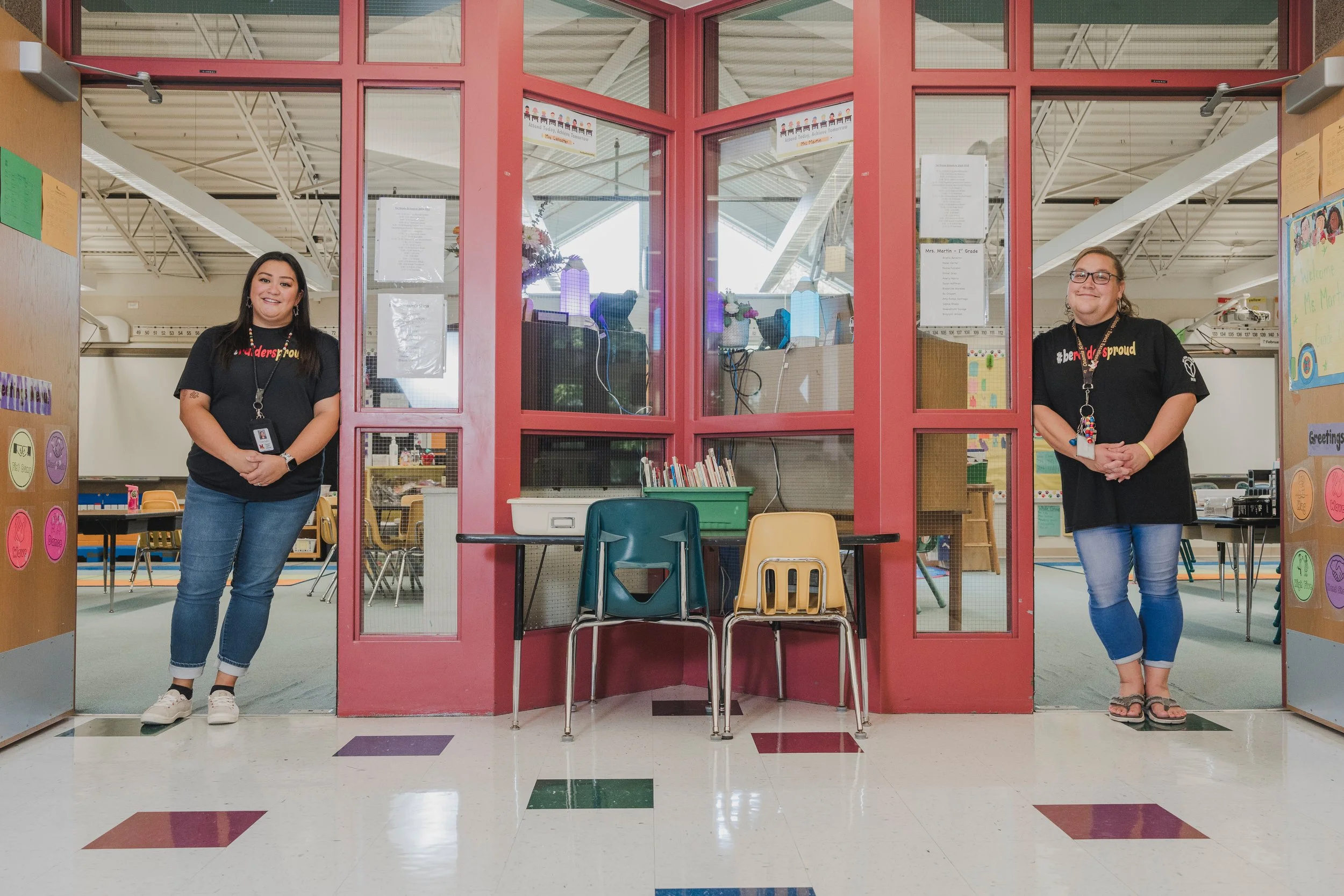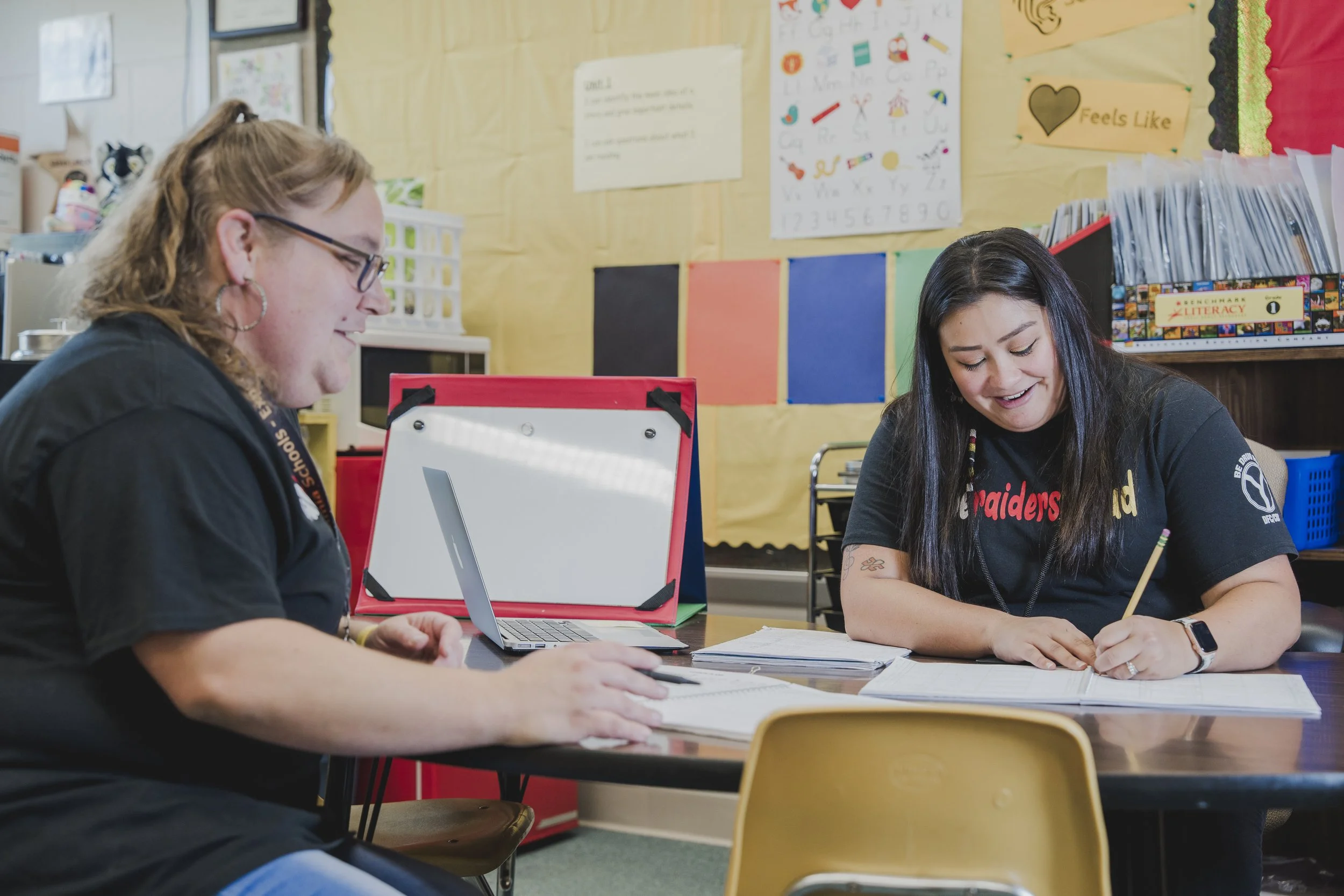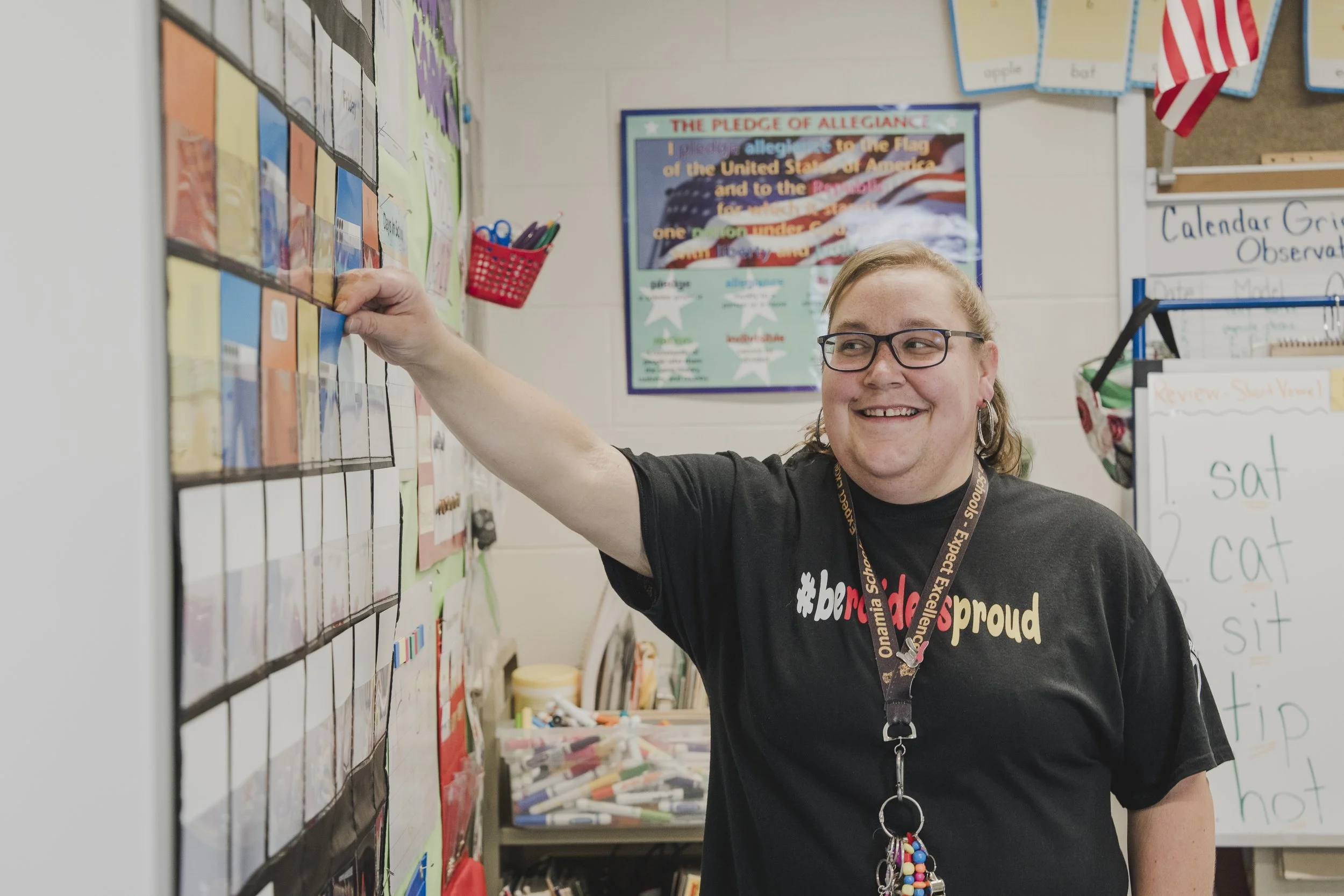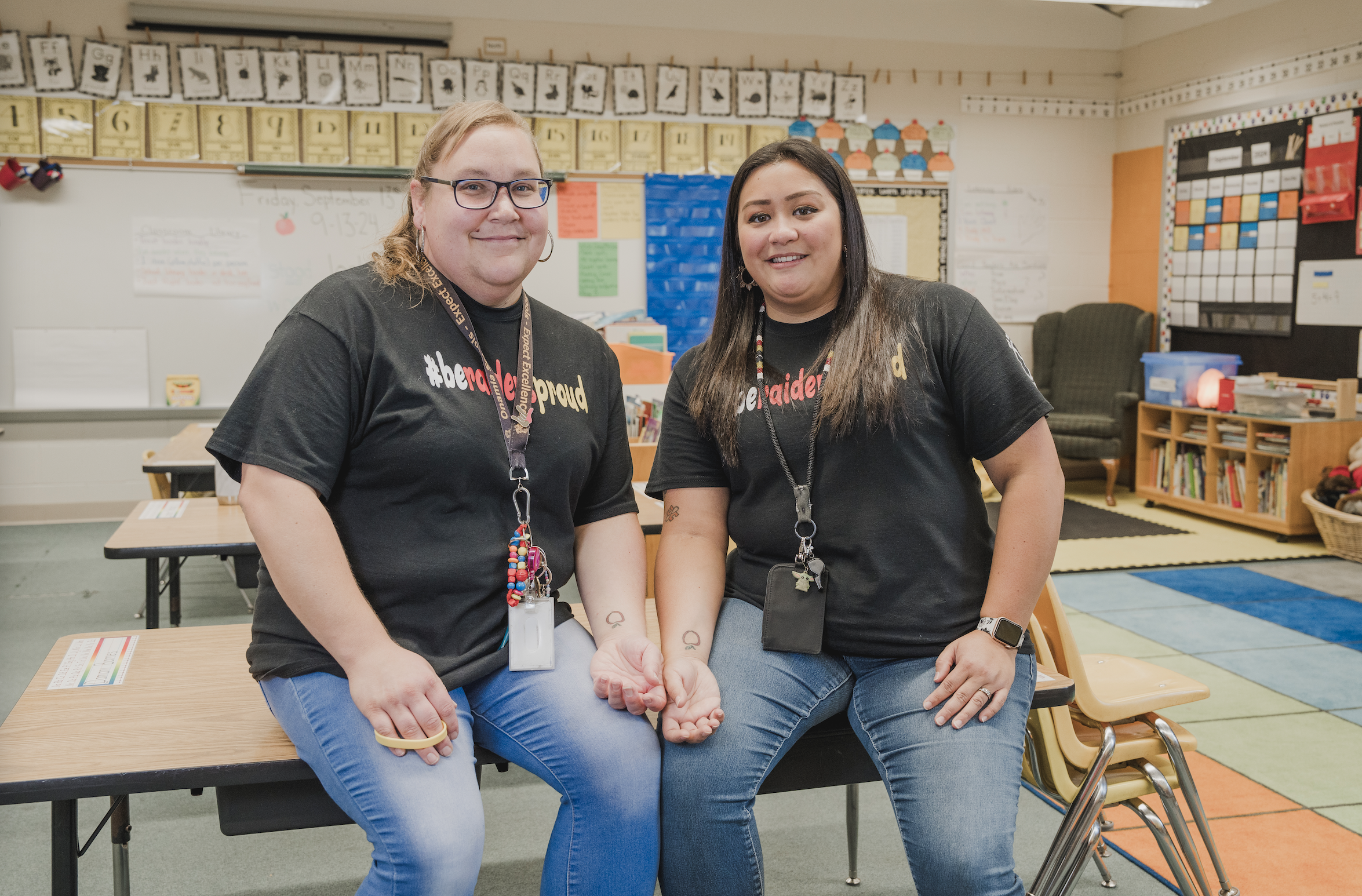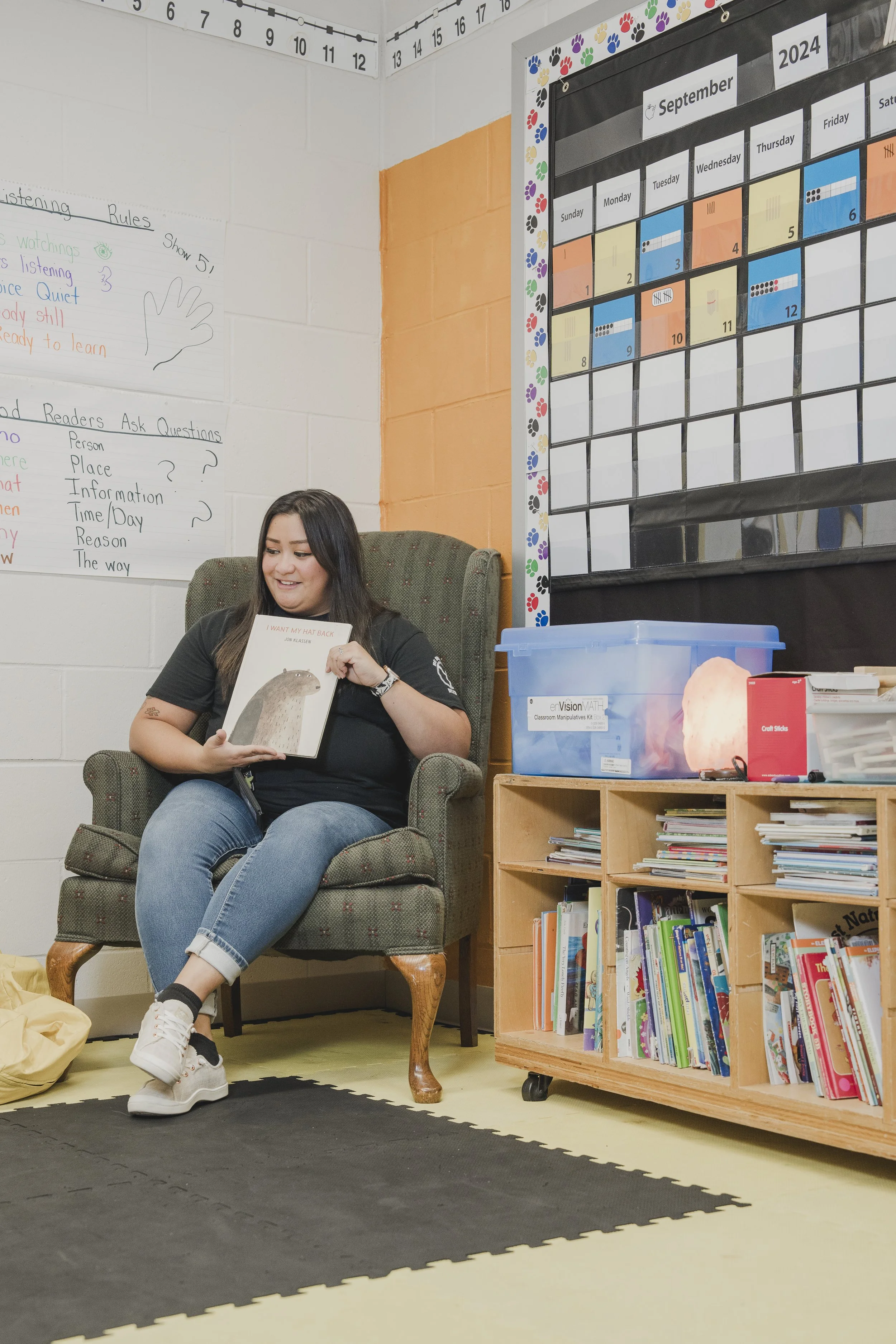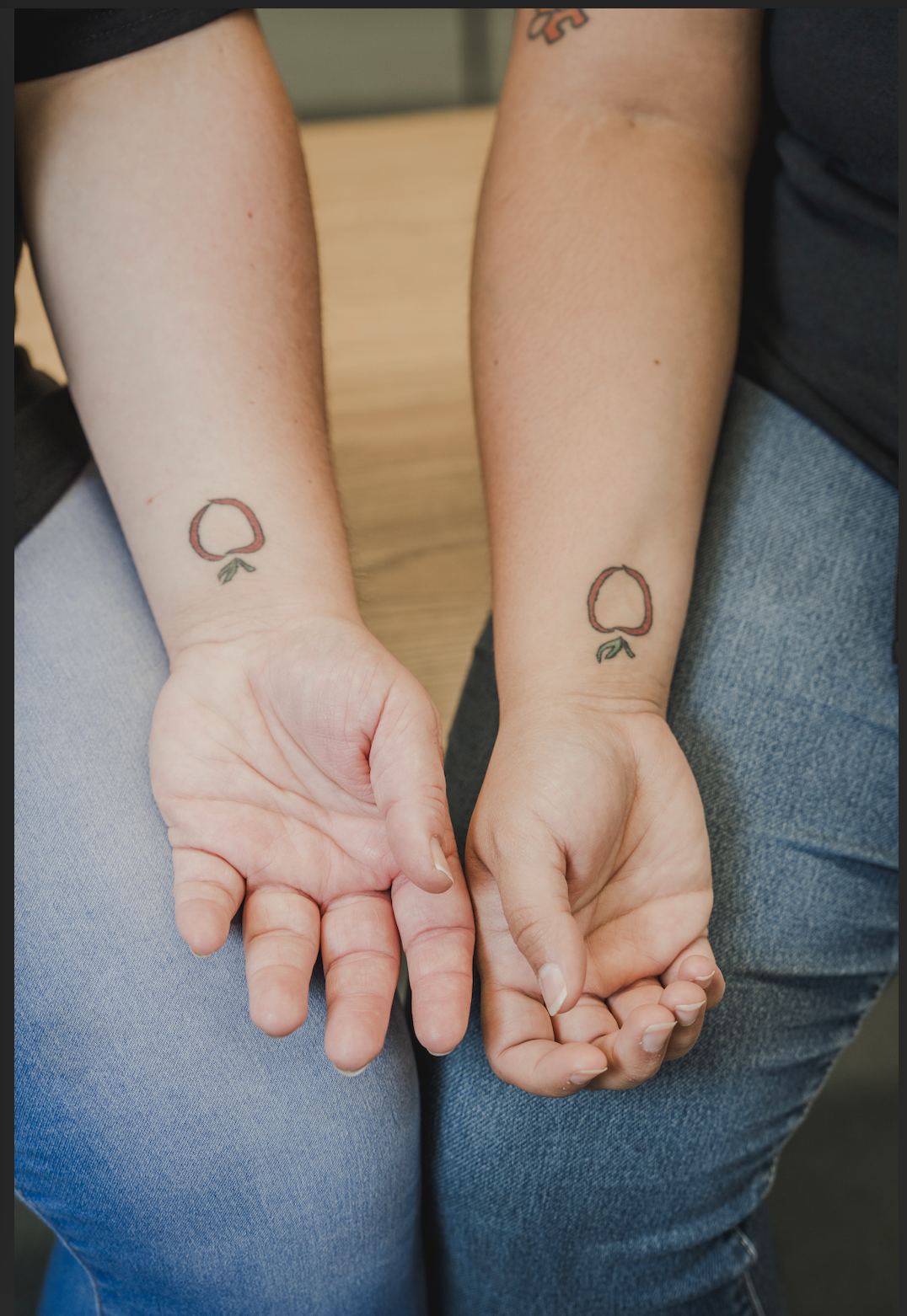Teaching is Teamwork: Sarah Lancaster & Cyndi Martin
Teamwork and Collaboration in the Classroom
2022 Minnesota Teacher of the Year Sarah Lancaster (on the left), and Cyndi Martin (on right)
We are celebrating the inspiring journeys of 2022 Minnesota Teacher of the Year Sarah Lancaster and her colleague Cyndi Martin. Both educators' heartfelt stories highlight how strong partnerships and a shared commitment to student success can transform the teaching experience.
Was being a teacher always your desired career path?
Sarah: I bounced back and forth. I think I knew in kindergarten when my teacher let me read a book out loud to my classmates. Then I bounced back and forth [during college at St. Cloud State University] and had an existential crisis where I thought I needed to be a doctor. I actually got into the process where I applied to medical school, got accepted, and then immediately knew that I needed to be a teacher and went back and finished my teaching degree.
I'm sure I would have been perfectly happy as a doctor, but I think teaching was absolutely my true call.
Cyndi: I definitely knew I wanted to work with children. Teaching was in my head, but also social work. I actually started college as a social work major. For the first year, I realized that I was a little too empathetic for that. I feel like I would have a house full of kids. I would just want to take them home and take care of them.
I thought this might be a good, different way to help kids and families. Teaching is definitely my calling as well. I'm super happy to have gone this route.
Cyndi and Sarah plan lessons together at Onamia Primary School
How did you meet each other?
Sarah: We existed in a building for an entire year and didn't really know each other. I mean, we knew of each other, but we didn't know each other.
I taught third grade when I first came to Anamia, so I taught third grade for the first two years of my career here. And into my second year, my teacher mentor that was in the grade level with me accepted a job at another school district, and so she ended up leaving. And so they needed a new third grade teacher to join me on the team. And the first, I remember, we hugged each other in the hallway.
Cyndi: We didn't even know each other, really. But we were so excited to teach together, and we were in the third grade wing, and it was right before summer, right. I remember I walked up to you and I gave you a hug, and I was like, “I'm so excited to teach with you.” If every teacher could have someone like we have on our team, they would never leave teaching. I mean, even the hard days. This is what gets you through, I think.
Sarah: [Collaboration] It's a constant between us.
We never needed to schedule a meeting because that's professionally just who we are. We want to keep focus on the kids, on their achievement, but also what worked for us and what didn't. And if it's a really hard day, be there for each other. And if it's a really great day, celebrate with each other.
“How did that math assessment go for you?” “Oh, it was great, but we struggled with number seven”. “Hey, that was one we did well on, but we need to recover number two and four, something like that.”
The last several years admin would instruct us to plan for data meetings on Wednesday morning, which is fine. I think some partnerships or some grade levels need that directive. I looked at our last principal, and I said, “We literally talk about our data all day, every day. It's in passing.”
“If every teacher could have someone like we have on our team, they would never leave teaching. I mean, even the hard days. This is what gets you through, I think.”
Cyndi Martin in her 3rd grade classroom
Sarah: We're two very different people. Cindy is very much type A. You could find a paperclip in her room and she could tell you exactly where it is.I am a type B teacher, so I've got cups everywhere and nothing is alphabetized. And that's just the way I operate.
We each have different strengths, right?
So, that's kind of the first thing is just knowing that we, even though we are very different people, we have the same drive. We have the same end goal.
Cyndi: The fact that we found similar teaching philosophies as far as giving our students an experience that they don't miss out on not being in the other class, I think has helped us tremendously in just giving to the students.
Cyndi and Sarah and their matching tattoos
What do you think makes teamwork the dreamwork?
Cyndi: Communication is incredibly important, and Sarah and I do not fall short in regards to communicating, whether it's as friends, or as colleagues, as professionals, or as whatever we need to be. So, for me, that's the biggest part of this successful teamwork, good communication. And whatever that looks like, whether you're frustrated with something and getting that out there or wanting to make a change or try something new.
Just within the last year, Sarah brought something brand new to our table, and I communicated it to the classroom. We shared some resources and then we launched it, and it's been a huge success. So if you're willing to communicate ideas, even something that might be a little scary and new, that can be a huge way to increase your teamwork and your ability to collaborate.
Sarah: I think two things ring out in my mind. The first one is understanding we are two very different people, but we have the ability to have the same desire to see kids succeed.And so knowing that, we both share a passion for having students who feel safe in the classroom and students who feel loved in the classroom and students who can learn in the classroom. Because I care about Cindy's students just as much as I care about my own.
We always make sure when we plan or when we work together, we ask ourselves, is this going to give an equal experience? Is this education educational equity provided for all first grade students, not just my students, not just her students, but making sure that we provide not identical experiences, but equitable experiences.
And the second is communication. Parents want to know what is happening in the classroom with their children, and they have every right to.
I mean, as a parent, my child is going into the four year old preschool program here, and I'm just as eager as he is to meet his teacher and know what's going on in his classroom and kind of relive that school experience on the other side this time. Actually, on like a weird third side, because now I've been in the classroom as a student, in the classroom as a teacher, and now I'm for the first time going through the classroom as a parent. And so we do everything we can, and we constantly talk about ways we can communicate with parents and be more transparent, because if we're transparent about what we're doing and what their child is experiencing in the classroom, they can understand that we just truly want them to succeed. And oftentimes when parents can feel defensive, you know, if there's behavior issues or if there's academic issues, a parent's first instinct is to get defensive because that's kind of one of the levels of protection that they have for themselves.
Cyndi: But then when you come to the table and you say, you know, I really just want to see the student succeed, what can we do together to help them? It kind of takes that defense down a little bit. And so as long as we're communicating as much as we can about what's going on in the classroom, it makes those meetings a little bit easier. It makes the transitions for parents a little bit easier, especially because these kids are in their first formative years of schooling.
They're young. We do a few things to increase communication. So we have a weekly newsletter that goes out for our families to see what's happening the following week so they can prepare, so they can be ready.
There are birthday announcements and student shout outs and kind of what we're doing as a main reading goal or math goal. We always have reminders for special dates, those kinds of things. We also have daily communication folders that tell a little bit about just how the day went.That's where we put any important paperwork. And I feel like we make ourselves readily available in terms of phone calls or emails and visits because we're both local and very, very local, super close. We make ourselves available when our families are able to be here and try our best to increase that success across the classroom to home kind of link.
Sarah Lancaster in her classroom
“I mean, kids change so fast. And just to watch that growth happen and knowing that you’re an integral part of why it’s happening, I think that’s so rewarding.”
What are some of the most rewarding aspects of teaching for each of you?
Sarah: Seeing growth and change and knowing that kids are different, not just in a school year, but every month or every week or day or minute.
I mean, kids change so fast. And just to watch that growth happen and knowing that you're an integral part of why it's happening, I think that's so rewarding. And then being able to watch yourself grow too, in friendships, in teaching, growing as an educator and learning what your style is and learning about how you, how you carry yourself in the classroom, I think those are some of the most rewarding parts of being a teacher and being an education.
Cyndi: For me, it's also the aha moments. I mean, everything Sarah said, also those moments you can see a child that struggled with something and then it clicks or they finally start to wait, is this how? And they can start to use their words to explain what they are suddenly understanding. It's just so exciting.
It's exciting to see that. I think for me, especially working with primary grades or first grade, we see a ton of that throughout the year because this is a huge grade for academic growth, real basic, fundamental things. But there are so many of them.
You see them grow emotionally, you see them grow physically, you see them grow academically. It's just a boom year and it's exciting to be a part of that. We also just both had, this was last year for you and two years ago for me, but our very first classes of students, so our third graders, and for you it would have been your second graders, just graduated from high school and we both went to their high school graduations.
And that was really surreal because you picture them as like those little seven, eight year olds, and then all of a sudden,10, 11, 12 years later, here they are walking across the stage and just knowing that you're part of that journey and that that's something they'll never lose, they'll always carry you with them.
What advice would you give to those young people who maybe haven't considered their career or are maybe thinking about teaching?
Sarah: I would advise them to be in a classroom, experience a classroom, because when you're in a room that's experiencing learning and joy and growth, it keeps you there, and then you go back and you think about it., Make sure your classroom experiences are with someone that you feel comfortable with and that you feel safe with.
Cyndi: Find your people that have similar experiences so you can share about them and find people who have gone before you so they can advise you. And find people who have not started the journey yet, so you can hopefully be one of the people that they look to in a few years or even that year or even that week.
Because this experience is unlike any other profession. And you have to have people. You have to have people.
Curious to learn more about Sarah Lancaster’s educator background? Consider reading this article from the Education Minnesota website: Teaching is an exchange of hearts for Onamia’s Lancaster.

